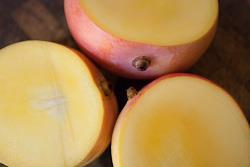
Japan has temporarily suspended imports of Australian mangoes following the detection of unidentified live insect larvae in treated fruit in the northern state of Queensland.
The find was reportedly made on Tuesday in a Brisbane vapour heat treatment (VHT) plant after the fruit had supposedly already been put through the process, designed to kill such pests.
“The fruit were on the inspection line, and I presume they were ready to go to Japan,” Fruitnet.com was told by Bruce Nastasi, whose company Gold Pak runs a VHT facility in Mareeba which specialises in exports to Japan.
Japanese authorities have temporarily suspended access from all Australian VHT plants, reportedly for a provisional 10-20 days. The precise length of the suspension is dependant on what the larvae turns out to be.
“The live insect larvae was found after the mango was treated, and are being kept and grown out and hopefully in the next week or two they will hatch and we can determine what they are,” explained Trevor Dunmall, industry development officer for peak body the Australian Mango Industry Association.
Whether the existence of the live larvae in the fruit post-treatment was a machinery failure or human error has not yet been determined.
The Australian Quarantine and Inspection Service (AQIS) has stated it will be reviewing the systems at the VHT facility.
“I’m not sure what to attribute it to. The sooner we find out what the larvae are the sooner we can work out how it’s happened,” Mr Dunmall told Fruitnet.com.
“It’s going to be interesting; this hasn’t happened to the mango industry before. Once we identify the pest, if it’s one in the quarantine protocol AQIS could negotiate with the Japanese authorities to regain access.”
If the larvae are a species not identified under the protocol, the situation could be substantially worse, according to Mr Nastasi.
“It might not be fruit fly,” he said. “It might be a species Japan’s never heard of, and it’ll be a disaster if that happens.”
Estimations of the short-term impact on Australia’s mango industry vary. According to Mr Dunmall, fruit previously bound for Japan shouldn’t have too many problems finding a new home.
“Those plants geared up for exporting to Japan will have to look at new markets, either export or domestic,” he stated. “But the cream of the crop goes to Japan, so there shouldn’t be any difficulty selling the fruit.
“There shouldn’t be a flood on the domestic market. Japan’s a premium market, and up to this season it was taking only moderate volumes.”
But for Ms Nastasi’s Japan-focused business, the forecast is bleaker.
“We put 40 people off yesterday; they had no jobs overnight,” he told Fruitnet.com. “It will have a big impact on the growers here.
“There’ll be more Keitt mangoes on the domestic market and that will put pressure on prices, so everyone is going to suffer. It’ll put pressure on the late varieties, which we’re beginning to harvest now.”






No comments yet